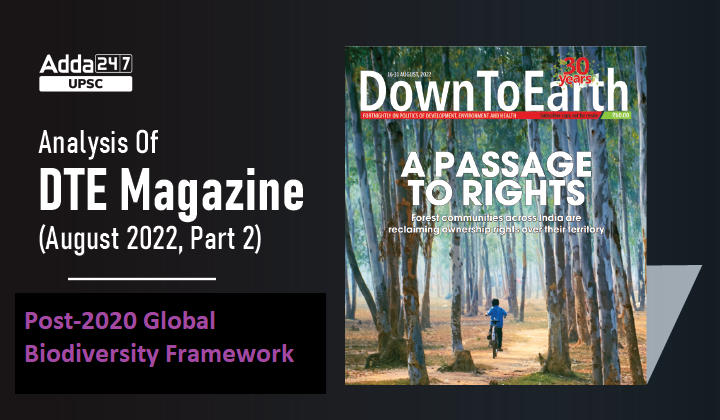Table of Contents
Introduction
- A new post-2020 global biodiversity framework (GBF) is being negotiated under the United Nations Convention on Biological Diversity (CBD).
- This framework will define targets and pathways for the conservation and sustainable use of biodiversity for the next decade and beyond.
- Since early 2019, consultation workshops and meetings involving all stakeholders have been organized at the national, regional, and global levels before its adoption at the resumed session of the 15th meeting of the Conference of the Parties (COP 15) which is scheduled for 2022 in Kunming, China.
Biodiversity at Risk!
- Biodiversity is an indispensable asset for Earth that provides both basic necessities as well as essential resources and services to all human beings.
- Over 4.3 billion people, more than half the world’s population, depend on biodiversity for their livelihoods and 70% of the world’s poor and vulnerable live in rural areas that depend directly on it.
- Today, however, 60% of the world’s ecosystems are degraded or unsustainably used.
- Nevertheless one million plant and animal species are at risk of extinction and biodiversity loss is projected to accelerate through 2050.
Targets to be achieved through Post-2020 GBF?
- The framework has 21 targets to be achieved by 2030.
- These have been categorised into three groups, with eight targets for reducing threats to biodiversity; five for meeting people’s needs through sustainable use and benefit-sharing and eight related to tools and solutions for implementation and mainstreaming.
Why Developing countries opposing DSI?
- Under the UN Convention on Biological Diversity (CBD), negotiations on how to regulate the use of digital sequence information (DSI) of genetic resources could further delay the process.
- Developing countries which are rich in biodiversity feel DSI provides a loophole through which developed countries can circumvent CBD, established three decades ago to ensure that communities receive the benefits arising from the use of biodiversity.
- At the latest Fourth meeting of the Open-ended Working Group on the Post-2020 Global Biodiversity Framework in Nairobi, Kenya held on June 21-26, parties from Africa clearly said that a decision on benefit-sharing from DSI is important and a failure to come to a consensus could postpone the adoption of the framework
- According to CBD, each country has sovereign rights over its genetic resources and anyone who wants to access the material needs to first inform the country and set down mutually acceptable terms, and ensure that benefits accrued from the use of the resource are shared with the country of origin so that communities and holders of knowledge to gain from the use of these resources in both monetary and non-monetary terms.
How managing DSI is Tricky?
- The vast potential of DSI was underscored during the pandemic when open access to the digital copy of the sars-cov-2 genome, uploaded by China, enabled researchers worldwide to develop vaccines against covid-19 in record time.
- But DSI is tricky to manage as the information can be used without movement of, or access to, physical specimens.
- For Instance, US biotechnology company Regeneron has prepared a treatment for Ebola using DSI from West Africa it is found in an open access database GenBank.
- DSI can also be used by the industry to create commercial products, and since the databases do not provide the source of origin, the community would not even know that it has been cheated.
What should be done?
- A multilateral benefit-sharing fund should be created.
- This fund, operated by the Global Environment Facility, could then be used to support the conservation and sustainable use of biodiversity.
- But such a multilateral fund will limit the role of Nagoya Protocol which establishes a legal framework to implement cbd’s objective of sharing benefits from scientific research with local stakeholders.
Conclusion
Instead of starting a new system, the international community should try to improve the existing one. For one, it would help if DSIS is uploaded into databases with the sources clearly indicated, in addition to access and benefit sharing contracts.


 TSPSC Group 1 Question Paper 2024, Downl...
TSPSC Group 1 Question Paper 2024, Downl...
 TSPSC Group 1 Answer key 2024 Out, Downl...
TSPSC Group 1 Answer key 2024 Out, Downl...
 Cabinet Ministers of India 2024, New Cab...
Cabinet Ministers of India 2024, New Cab...







